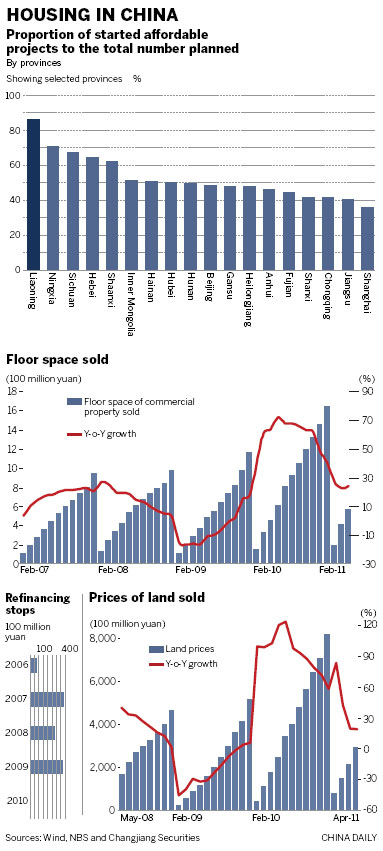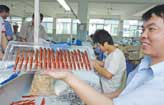Economy
A not-so-hot property
Updated: 2011-07-11 09:31
By Yu Ran (China Daily)
Financial risks
The developer added that there is a risk that he won't have enough money to pay back his high-interest loans if the number of home buyers continues to decline.
In the second quarter, a survey of clients by the Wenzhou branch of the People's Bank of China, the nation's central bank, showed that private lending has been the most popular investment method for more than 24 percent of those surveyed, that's 4.75 percentage points higher than in the first quarter.
 |
"The decline in deals in the property market is the natural result (of the tightening policy) and it definitely will continue to affect the real estate market in Wenzhou in the coming months," said Zou Xiqian, who works at a local property agency.
"The credit companies and private lenders in Wenzhou have the ability to gather up to 1 billion yuan ($154.5 million) in one day for property developers, with a monthly interest rate of at least 3 percent," said Zou.
He added that in order to attract investors back into the property market, the average price of a pre-owned commercial property in the downtown area of Wenzhou has decreased by at least 10 percent.
Although the number of pre-owned properties sold has continued to decline since the government strengthened restrictions on purchases of private property earlier this year, the number of newly launched commercial and residential properties are still welcomed by the majority of investors.
"There were thousands of people coming to the launch of one of our newest projects in Wenzhou city center, which had an average price of 50,000 yuan a square meter and with the smallest apartment measuring 200 square meters," said Zou.
With signs that the country will extend the restriction policies to a wider range of cities, and as borrowing from banks becomes more difficult, a great many smaller-scale real estate companies in Wenzhou could shut down because they are unable to compete efficiently with the top property developers.
"I think about 20 to 30 percent of real estate companies could choose to give up by closing down, because of a lack of money to compete with major developers," said Zou.
One Wenzhou-based real estate investor said that he used to own more than 100 properties, mostly in Shanghai, but said he has sold 80 of them since last year for fear of putting his personal capital at risk.
"I started making investments in residential and commercial properties in Shanghai and other first- and second-tier cities, such as Hangzhou, Tianjin and Chengdu, about six years ago but I've lost my faith in it now, following the release of the restriction policies," he said.
He added that an increasing number of his friends have quit, or are quitting, their investments in the property market, resulting in at least 30 billion yuan in private capital flowing back to Wenzhou.
In addition, sources familiar with the property market in Wenzhou revealed that a number of property developers have closed down and sold off large-scale construction projects to solve the anticipated financial problems.
"I've heard that many property developers were forced to borrow money from underground banks more frequently than they used to, with extremely high monthly interest rates of 30 percent," said Zou.
As the main channel for property developers to obtain instant financing in the city, the mature underground banking system, operated by hundreds of credit companies and private lenders, gave enough financial support to prevent the local real estate market from getting into difficulties.
Most borrowers come to the gray market for quick loans, with periods ranging from one night to 30 days. With the lowest monthly rate for property developers at about 20 percent, or 790 percent a year, nobody can afford to borrow long-term in this market.
These rates of interest may seem exorbitant, but they are seen as necessary to allow lenders to cover the high risk of making unsecured loans without collateral or background checks into the repayment capabilities of borrowers.
"Local property developers that only need short-term credit to tide themselves over choose underground banking and the option of high daily or monthly interest rates," said a man who would only give his name as Yi, and who is regularly involved in private lending and frequently deals with individuals and local enterprises.
Yi, who declined to reveal his full name because of the sensitivity of the issue, was one of the pioneers of unregulated lending in Wenzhou. In 2007, he launched an underwriting agency, initially acting as a go-between for banks and lenders.

Specials

90th anniversary of the CPC
The Party has been leading the country and people to prosperity.

The write stuff
'Pen capital' goes back to drawing board for answers to economic changes taking shape in Zhejiang

Say hello to hi panda
An unusual panda is the rising star in Europe's fashion circles